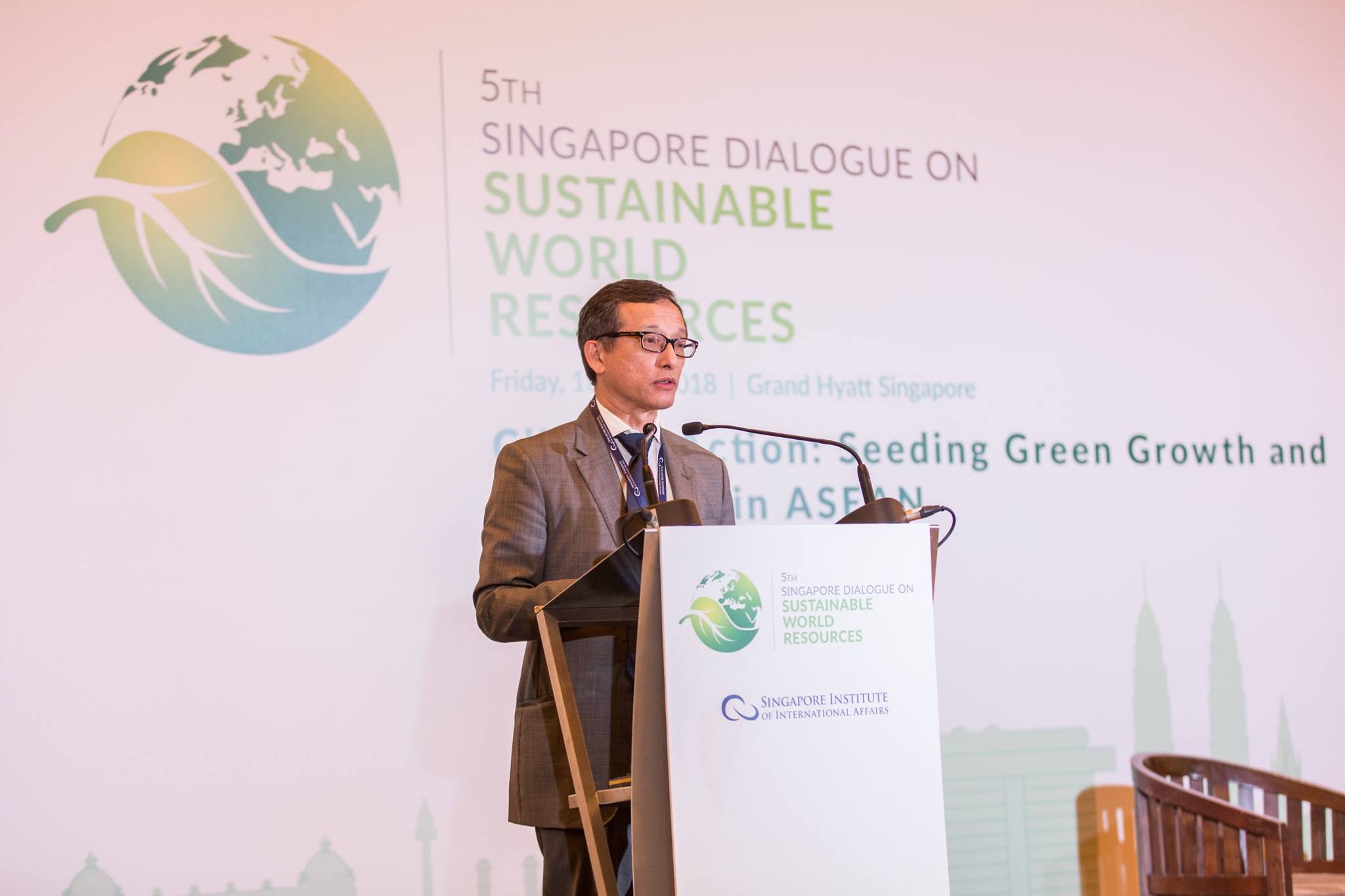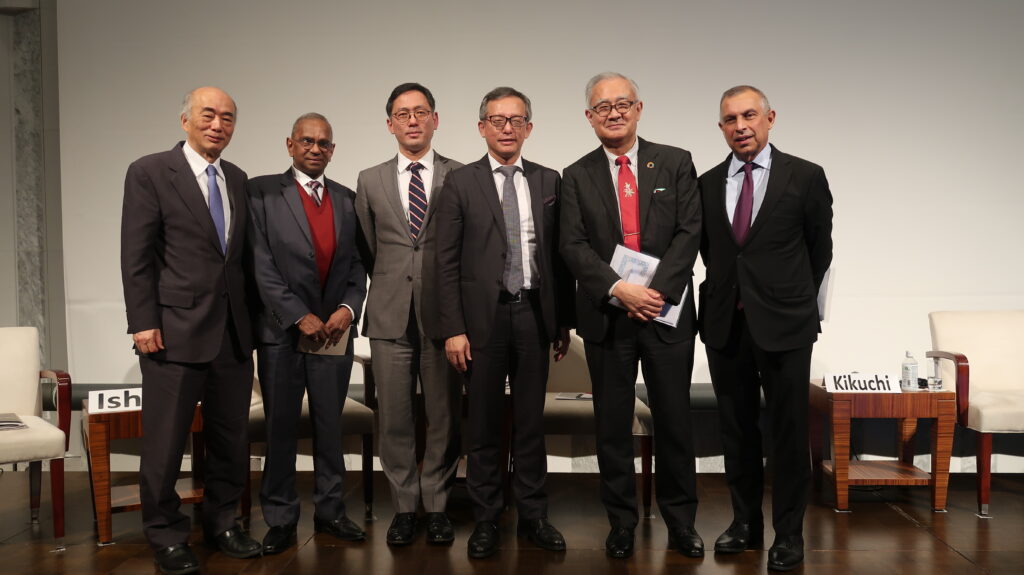Media Release
For Immediate Release
ASEAN governments and corporates increasingly implement green growth approaches
At the 5th Singapore Dialogue on Sustainable World Resources, ASEAN leaders
highlight deepening partnerships and financing for sustainable growth
Singapore, 18th May 2018: As climate change intensifies, ASEAN countries are increasingly adopting green growth, which places equal importance on environmental and economic objectives. Throughout many ASEAN countries, governments are taking concrete steps to balance economic growth with responsible sectoral and regional planning.
“The theme for Singapore’s Chairmanship of ASEAN is resilience and innovation. Among our key priorities is the need to address climate change,” said Mr. Masagos Zulklfli, Minister for Environment and Water Resources, Republic of Singapore. As ASEAN Chair, Singapore is spearheading partnerships such as a Special ASEAN Ministerial Meeting on Climate Action in July 2018 and the creation of an ASEAN Smart Cities Network, which will build ASEAN cities’ capacity to achieve sustainable urban development.
Minister Masagos was speaking at the 5th Singapore Dialogue on Sustainable World Resources (SDSWR), organised by the Singapore Institute of International Affairs (SIIA) on 18 May 2018 at the Grand Hyatt Singapore. This year’s Dialogue, themed “Climate Action: Seeding Green Growth and Resilience in ASEAN”, was attended by 350 industry experts, corporate leaders, and key decision-makers from around the region.
Dr. Bambang Brodjonegoro, Minister for National Development Planning, Republic of Indonesia, outlined how Indonesia is continuing to set aggressive targets for the reduction of greenhouse gas emissions. After having established a framework for managing its forests and peatland, Indonesia is now turning its attention to other large carbon emitters, such as the transport and energy sectors.
Senator Loren Legarda of the Philippines highlighted how her role as the Chair of the Senate Committees on finance and climate change has translated to a greater ability to harmonise energy, climate, agriculture, and food policy with public and private financing.
The private sector stands ready to support by entering public-private partnerships to grow green sectors, such as renewable energy. At the same time, major companies have begun climate-proofing their operations by integrating climate targets into their business models.
“It requires market, society, and the government to come together to recognise the mutual drivers that will allow us to accelerate the pace towards decarbonisation,” said Ms. Goh Swee Chen, Chairperson of the Shell Companies in Singapore. With such cooperation, she continued, “we believe it is technologically, industrially, and economically possible to go to net zero emissions by the year 2070.”
The plantation sector will be the keystone of green growth in ASEAN. This is because of the sector’s outsize carbon footprint and Southeast Asia’s large rural population. Plantation companies, too, have evolved from simply responding to controversies such as deforestation and haze. Instead, they are now joining forces to form “pre-competitive” collaborations that tackle these industry-wide problems at their root.
“Environmental issues are not about trees and forests anymore – it’s more of a social issue these days,” said Mr. Agus Purnomo, Managing Director, Sustainability and Strategic Stakeholder Engagement of Golden Agri-Resources. “It’s an issue of getting consensus and agreement with the local community.”
For ASEAN and Asian countries, sustainability is no longer about compliance or fulfilling the demands of external markets. “For those of us in agribusiness, we adopt one uniform standard regardless of the exporting country. We don’t sell sustainable products only to one market and not others,” said Dr. Simon Lord, Chief Sustainability Officer of Sime Darby Plantation.
During this period of evolving standards and expectations, differences in opinion and controversies may arise. However, it is essential to continue engaging companies and governments to ensure that they deliver on their climate commitments and that no community is left behind in the transition.
During the Dialogue, the SIIA also launched a report titled “Financing Indonesia’s Independent Smallholders”. The report analyses projects in Indonesia that improve independent smallholders’ access to finance as a means of addressing environmental and social issues. The findings of the report are drawn from a workshop jointly organised by the SIIA and the World Resources Institute Indonesia in Jakarta last October. A summarised version of the report was distributed at the event, while the full version is available as a PDF download at https://siia.hellopomelo.space/wp-content/uploads/2018/05/Smallholder-Financing.pdf.
Media Contact
Email: media@siiaonline.org
ABOUT THE SINGAPORE INSTITUTE OF INTERNATIONAL AFFAIRS (SIIA)
The SIIA is an independent think tank dedicated to the research analysis and discussion of regional and international issues. Founded in 1961 and registered as a membership-based society, the institute is Singapore’s oldest think tank that aims to help Singapore become a more cosmopolitan and global society through public education and outreach on international affairs. The SIIA is also a founding member of the ASEAN Institutes of Strategic and International Studies (ASEAN-ISIS), a regional alliance of think tanks and plays a key role in Track II diplomacy, supplementing official dialogue between governments.
Since 2013, the SIIA has consistently ranked highly as one of the top think tanks in Southeast Asia and the Pacific, in the Global Go-To Think Tank Index done by the University of Pennsylvania. For 2017, the SIIA was ranked the no. 1 think tank in Asia and in the top 50 globally (excluding USA). Visit www.siiaonline.org for more information.
ABOUT THE SIIA SUSTAINABILITY PROGRAMME
The SIIA’s sustainability programme focuses on haze caused by fires in Indonesia and on the sustainability of the plantation sector, both key issues for Singapore. The SIIA also works on climate change issues facing ASEAN and Asia. The SIIA’s sustainability work goes back to 1997, when it organised Singapore’s first haze dialogue with the Singapore Environment Council. Over the years, the SIIA has increasingly broadened its sustainability work from haze to related issues, such as forest governance and sustainable livelihoods. In 2014, the SIIA launched the annual Singapore Dialogue on Sustainable World Resources, now in its 5th year, to highlight best practices within the plantation industry. In 2016, the SIIA co-organised the Regional Peat Restoration Workshop, the first NGO-led regional workshop to focus on peat restoration.




